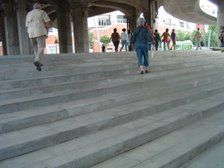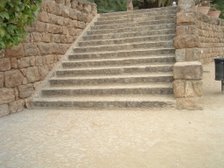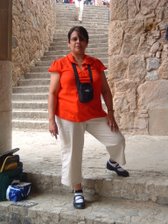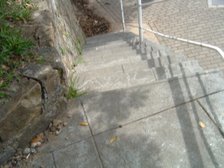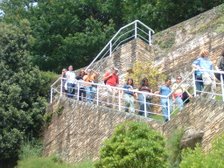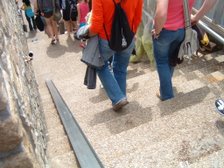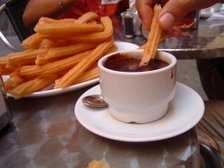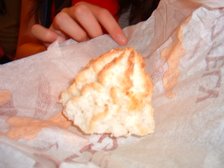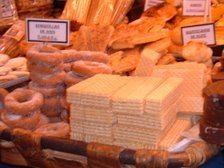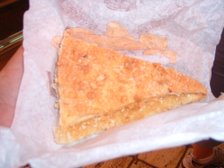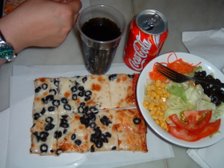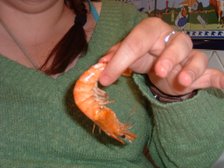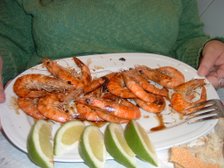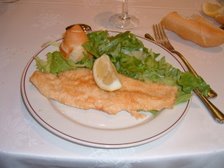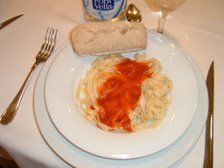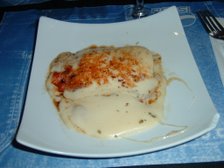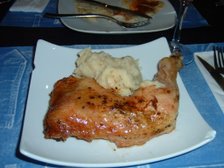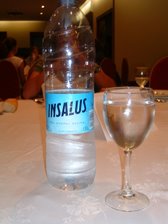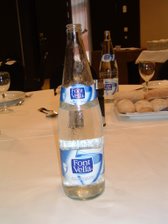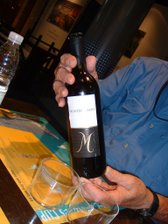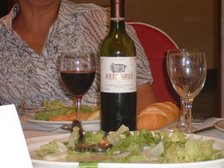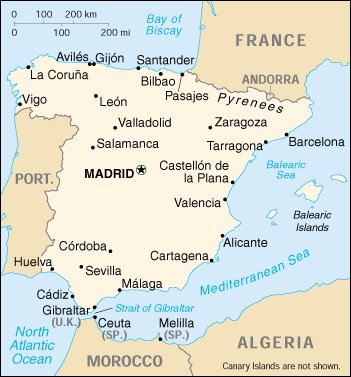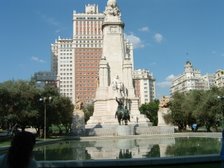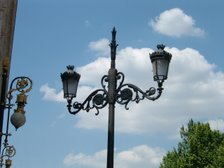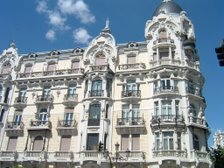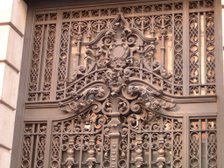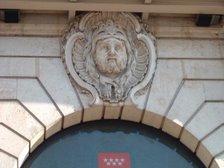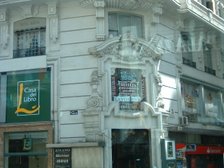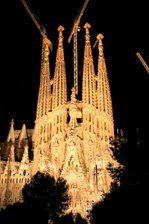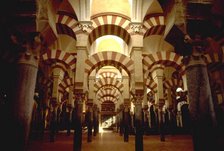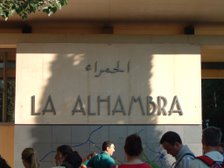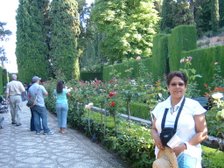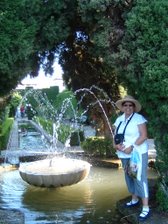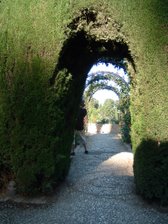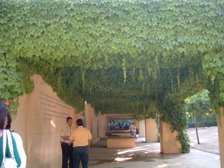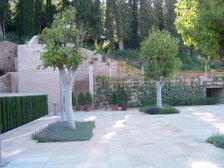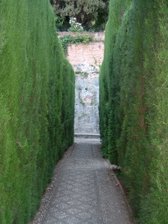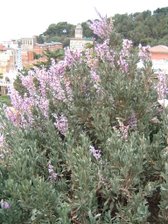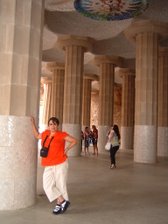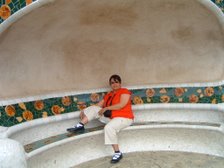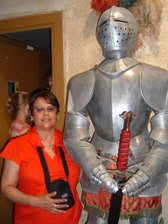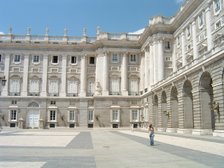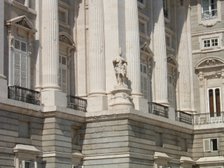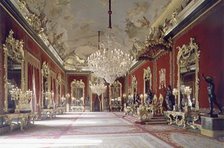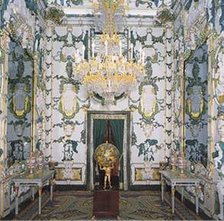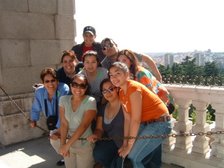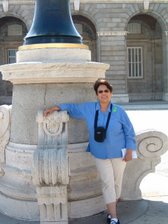In 951 Castilla becomes independent. Christian soldiers attacked and it did not go unnoticed in Cordoba.
In the tenth century, a young noble from an Arab family, named Al-Mansur, who was educated in law and literature, became manager of the estates of Prince Hisham. He latter gained the title Hajib. Al-Mansur was victorious in battle. He fought against the Christians. He was charming and equally ruthless. He became suspicious of his sons. One day at dinner he had his son thrashed to death. This was a source of entertainment for Al-Mansur. He then had his other son decapitated. He took great delight in decapitations as a form of punishment. He once made a "great pyramid" of trophy heads. Then he had the salted heads sent around the caliphate to frighten his enemies.
In 997 Mansur's army captured the city of Santiago de Compostela destroying its shrine. He had the doors and bells removed and sent to Cordaba, to be used in the mosque. This was an insult to Christian Spain.
AL-ANDALUS
The effete (barren) Calip Hisham II produced no heir for the throne. Before his death he named Mansur´s son Sanchuelo to succeed the throne. During this time there were many revolts. As a result, Al-Andalus split up into about twenty small kingdoms, know as taifas.
The Moors controlled about two-thirds of the peninsula. The most powerful taifas were Sevilla and Granda then Cordaba, Almeria, Zaragoza, Badojoz, and Toledo. These "petty kingdoms" fought and betrayed each other.
During this political decline, there became a brief budding of cultures. Kings tried to out do each other by housing in their libraries impressive collections of enormous volumes of literature and poems. As a result sometimes these poems or literature were not of great quality. One Moorish poem read "Such was my kissing, such my sucking of his mouth, that he was almost made toothless."
The Moors had a passion for wine and women. They soon lost interest in fighting their own battles. They employed mercenaries "even Christians" to do their fighting as stated in The Story of Spain.
THE RECONQUISTA
The pope called for a crusade. Slowly the La Reconquista (the Reconquest) was born and lasted for eight centuries. According to the The Story of Spain, this was the most "distinctive factor of the medieval Spanish history." Christian progress was slow due to the harsh climate, threat of Moorish reprisals, and discouraged settlers. The death of Christian kings brought about division of their domains.
FERNANDO EMEROR OF THE SPAINS
Fernando I (Ferdinand I) occupied Leon and became "emperor of the Spains." He is also known as Fernando I of Castilla. He became the leading figure in the Reconquest. Fernando I captured Valencia and Portuqal. When he died, war emerged between his two sons Alfonso of Leon and Sancho of Castilla.
EL CID
Interesting facts: Cid comes from the Arabic word seyyid, or lord. Campeador is Latin campiduetor meaning leader in the field.
During Sancho's reign, a young knight named Rodrigo pledge his allegiance to King Sancho of Castilla. Rodrigo became the most exalted figure in Spanish history. He earns the title “El Cid Campeador.” Cid fought for the Christians until his Lord was murdered. He suspected his Lord's half-brother Alfonso of the murder. This causes conflict between the King and Cid. The King sent Cid into exile. "Cid proceeded to fight in the service of the potentate of Zaragoza, a Moorish city," according to The Story of Spain.
In 1085 Alfonso's army recaptured Toledo in the "first crucial victory of the Reconquest" according to The Story of Spain, which led to the boost of morale. The Christians entered the old Visigoth capital the heart of meseta.
This alarmed the Moors King of Sevilla. He sought aid from Muslim Africa. The Almoravids leader, Yusuf ibn-Tashufin came to his aid. Yusuf troops were dark-skinned nomads who converted to Islam and were said to be religious fanatics. They swore to stamp out anyone who slipped from Muslim orthodoxy. His troop where feared, they fought man-to-man style, using rapiers, shields of hippo hide, and took heads for trophies. While the Christian fought infantry style (lines of archers moving to the command of drums).
Alfonso barely escaped. Panic rose throughout Christian Spain. Alfonso sought the aid of El Cid. Cid soon gained control of Valencia and emerged an independent ruler. "Muslims stood in awe of Cid" as noted in The Story of Spain.
El Cid fought for the Christians and the Moors. Nevertheless Spain considers El Cid a national hero.
Existing in Spanish literature is an epic poem written about Cid, El Cantar del Mio Cid (1140) and “countless” biographies and even a Hollywood historical epic film EL Cid (1961), directed by Anthony Mann staring Charlton Heston and Sophia Loren. Heston once said, “The Cid was surely one of the remarkable men of the Middle Ages… [He] became a mythical figure, a figure of legendary proportions” as quoted on Website
GRANAD AN INPORTANT CENTER
Granad is one of the most beautiful cities in the world. It is a city of incomparable monumental wealth, exquisite parks, gardens and rich history. It is located between the Mediterranean Sea and the peaks of the Sierra Nevads.
The Moors had a profound effect on the peninsula. The palace and fortress Alhambra was built in Granad between 1248 and 1354. Alhambra houses some of the finest examples of Moorish art such as plaster moldings, stucco works, marble columns, domes, gardens, and fountains. The Moors introduced advanced systems of specialized hospitals for lepers, insane, wounded soldiers and Muslim scholarship. They excelled in astronomy, botany, and geography. They insisted that the earth was round. The Moors brought Arabic numerals, replacing the Roman system, as well as algebra and higher mathematics.
Interesting facts: Words of Arabic origin:
Algebra, Alcazar (castle), Arroz (rice), Aduana (customs), Alcalde (mayor), Naranja (orange), Azucar (sugar), and limon (lemon)
Interesting facts: Spanish-English cognates:
Alcohol, alchemy, alkal, camphor, elixir, syrup, talc, nadir, zenith, almanac, zero, coffee, jasmine, saffron, and sesame.
JEWS IN SPAIN
A revolt in Palestine ended the Jewish state for two millennia. Jews scattered throughout Roman and thousands of families fled to Hispania and lived on the peninsula for centuries.
Reccared son of King Leovigild united the Kingdom under one religion Catholicism around 590. Reccared wrote the first anti-Jewish treatise.
In 624, the Goths ruled the entire peninsula, excluding Basque Lands. The Jews never forgot what the Goths had done to their descendants and took revenge, leading to hundreds of deaths. The oppressed Jews welcomed the invasion of the Moors around 732.
Spain’s society was divided into three castes based on religion: Muslim, Christian, and Jews. Jews became physicians, pharmacists, interpreters, and money-changers, making them the "greatest beneficiaries" of Moorish rule as stated in The Story of Spain. Nevertheless, they were though of as the lowest class of people and the "Christian job was to rule." "Jews were blamed for various troubles, especially economic crises. According to The Story of Spain (General Franco once stated “In Spain you are Catholic or you are nothing.”)
Interesting facts: Words of Arabic origin:
Algebra, Alcazar (castle), Arroz (rice), Aduana (customs), Alcalde (mayor), Naranja (orange), Azucar (sugar), and limon (lemon)
Interesting facts: Spanish-English cognates:
Alcohol, alchemy, alkal, camphor, elixir, syrup, talc, nadir, zenith, almanac, zero, coffee, jasmine, saffron, and sesame.
JEWS IN SPAIN
A revolt in Palestine ended the Jewish state for two millennia. Jews scattered throughout Roman and thousands of families fled to Hispania and lived on the peninsula for centuries.
Reccared son of King Leovigild united the Kingdom under one religion Catholicism around 590. Reccared wrote the first anti-Jewish treatise.
In 624, the Goths ruled the entire peninsula, excluding Basque Lands. The Jews never forgot what the Goths had done to their descendants and took revenge, leading to hundreds of deaths. The oppressed Jews welcomed the invasion of the Moors around 732.
Spain’s society was divided into three castes based on religion: Muslim, Christian, and Jews. Jews became physicians, pharmacists, interpreters, and money-changers, making them the "greatest beneficiaries" of Moorish rule as stated in The Story of Spain. Nevertheless, they were though of as the lowest class of people and the "Christian job was to rule." "Jews were blamed for various troubles, especially economic crises. According to The Story of Spain (General Franco once stated “In Spain you are Catholic or you are nothing.”)
Interesting Fact: King Fernando had Jewish blood from his maternal grandfather.
King Ferdinand and Queen Isabella of Spain expelled all Jews from the land after the Moors were driven out of Granada. This ended the largest and most distinguished Jewish settlement in Europe. It is said the real reason for the expellsion was "the religious zeal of the Church, the Queen, and the masses." Jewish History Sourcebook: The Expulsion from Spain, 1492 CE. Nevertheless, the official reason was that the Jews encouraged the Marranos "persist" in their Jewishness thus not allowing them to become good Christians.
BIRTH OF SPAIN AS A NATION
The road to Malaga once was drenched in the blood of Christians and Moors. Queen Elizabeth I and King Fernando of England started capturing Spanish vessels on the way to the New World. Because of this Spain suffered massive economic losses. Also contributing to the cause was the expulsion of the Jews and Moors Spain's economy started to collapse in the 16th century, brining the Golden Age of Spain to a close.
